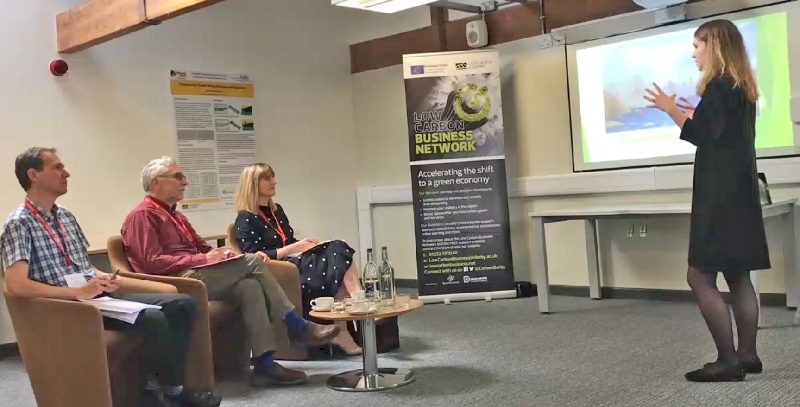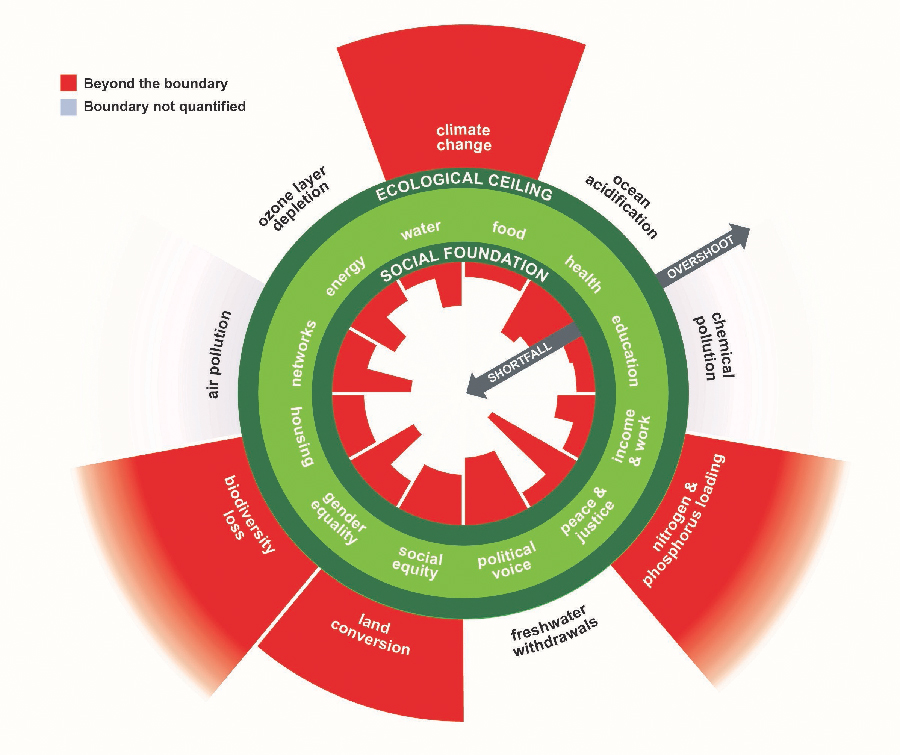This is an emergency. We are at a critical moment in human history and we stand on the brink of a climate and ecological disaster. As business leaders we must act now to mitigate the worst impacts of climate change. This will require radical changes to the way we all live, work and consume resources. Businesses must take their responsibility to accelerate action to reduce greenhouse gas emissions in line with the science. Read the IPCC report on the impacts of global warming of 1.5°C
“Climate Emergency” is the acknowledgement that urgent and fundamental change is needed to mitigate the extent to which global warming causes irreversible change to the Earth and all life on it. Ecological Breakdown describes a situation where an ecosystem suffers drastic reduction and extinction of species and organisms. This is usually precipitated by disastrous events happening in a short timescale.

Top 10 climate facts
- We are on track to reach a global temperature rise of 3 degrees by the end of the century.
- We need to reduce carbon emissions by 45% from 2010 levels by 2030 and become net zero by 2050 to meet the 1.5ºC scenario of the Paris Agreement.
- Wildlife populations have declined an average of 60% since 1970.
- Only 7% of reefs in The Great Barrier Reef have escaped bleaching entirely.
- We’re on course to lose over half of all insects by the end of the century.
- Over the past 2 decades, sea levels have risen by 3.2mm per annum and three quarters of all large cities are located on the coast (UN).
- The past six years – from 2014 -2019 – were the warmest years ever recorded in the 140 years that NOAA has tracked global heat. If current trends continue, the Arctic could be entirely ice-free by 2040 (Arctic Council).
- With the current rate of soil degradation, we have 60 years of farming left.
- Climate change will drive the migration of 200 million people worldwide by 2050.
- Climate change could have an impact on a greater range of diseases since approximately 63% of pathogens are climate sensitive.
What does declaring a climate emergency mean?
Declaring a climate emergency means committing to tell the truth about the reality of the climate breakdown and making a meaningful commitment to address this breakdown, by taking action to radically and urgently reduce carbon emissions.
What are we committing to?
- To develop a ‘Climate Emergency Plan.’ within 6 months.
- Sharing this declaration publicly and report your ‘Climate Emergency Plan’progress annually.
- Accelerate our current climate action trajectory. Ensure the ‘Climate Emergency Plan’ represents an acceleration of our current trajectory and actions are 1) in line with what is needed to reach net zero timescale between 2025-2050 and 2) keeps the planet within 1.5 degrees
- Set interim targets. Design realistic milestones which allow for business reconfiguration with appropriate interim targets if net zero is beyond 2030.
- Share best practices. Connect and engage with peers.
- Advocate for change. Encourage our team, suppliers, clients, community plus local and national authorities to take action.
View this post on Instagram
What have we already done?
- Used public transport, active travel and remote working for client meetings and events since 2014.
- Had an environmental policy since 2015.
- Have conducted environmental audits with Investors in the Environment and Green Mark of our business and received accreditation and awards.
- Used our social media platforms to support the climate science and advocate for urgent action.
- Worked with environmental scientists to share their research findings with a wider audience.
- Installed solar panels at Mair Perkins’ home office. supplied by Nottingham based solar installer, Geo Green Power.
- The rented office space (11a St Mary’s Gate) electricity is supplied by Ecotricity, a renewable energy supplier.
- A member of the East Midland’s De-carbonise Network (formerly Low Carbon Business Network) and in 2019 developed a business strategy with positive environmental action at the heart of it.
- Have volunteered our business services in visual communication to environmental organisations and campaign groups.
- Signed up for the Flight Free pledge in January 2020. This also means not attending any conferences that can not be reached by rail. Mair flew to a conference for a speaking engagement in 2019 and offset the flight with tree planting but has decided that not flying at all is the most effective action from now on.

Our Climate Emergency Plan: April 2020
- As of April 2020 we are in the process of switching to Triodos business banking. This is to ensure our finances do not fund environmentally harmful industries.
- Continue the Green Mark programme and conduct another environmental audit in June 2020 and set bolder targets to reduce our green house gas emissions.
- Develop a plan to switch home office heating energy from gas to a low carbon option. Explore this with the landlords of the city office too.
- Develop a plan for using low carbon digital services.
- Ensure any future electrical devices purchased are manufactured to the highest ethical and environmental standards or use second hand equipment when possible.
- Be an advocate for action on the climate emergency in both our business community and creative community.
- Continue to donate our visual communication time and skills to environmental organisations and campaign groups.
- Continue to use our social media platforms to support the climate science and advocate for urgent action.
- Decline work with organisations who are contributing to the climate emergency and not actively changing their environmental practices.
- Update our environmental policy to reflect these actions.
- To publish an annual update on our climate action plan (due April 2021).
View this post on Instagram
Climate Emergency Plan Progress Report: April 2021
- Set up a Triodos business bank account to receive all client payments. We are still in the process of closing our previous business bank account.
- Completed the Green Mark programme for 2020.
- Continued to commute to work by cycling or walking (when not working at home!).
- Continued the flight-free pledge.
- Continued to follow a plant-based diet and buy locally from independent shops as much as possible.
- Written to local politicians and the local authority staff on climate, biodiversity and air quality issues in Derby.
- Still developing a plan to switch home office heating energy from gas to a low carbon option. Explore this with the landlords of the city office too.
- Still developing a plan for using low carbon digital services. Our website is hosted by 34SP who power their Manchester servers on 100% renewable energy.
- Updated our environmental policy.
- Used our social media platforms and zoom meet ups to advocate for action on the climate emergency in both our business community and creative community.
- Continued to donate our visual communication time and skills to environmental organisations and campaign groups.
- We volunteered for the Stop the A38 campaign in Derby. The A38 road expansion would emit 131,000 tons of CO2 from the construction alone and fell thousands of trees in Derby – at a time when we need to urgently decarbonise transport.
- We volunteered design skills to Transport for Quality of Life for a report on the carbon impacts of road building.
- We volunteered design skills for Extinction Rebellion Derby.
- We volunteered to help Stop HS2 Staffordshire.
- We volunteered with Derby Climate Coalition and Derby Climate Hub.
- Continued to use our social media platforms to support the climate science and advocate for urgent action.
- Declined work with organisations who are contributing to the climate emergency and not actively changing their environmental practices.
- Continued to work with academics to communicate their environmental science research findings.
- Updated our environmental policy.

We need an economy that preserves the natural and social systems upon which life and thriving markets depend
One of the primary drivers of the climate emergency, and the greatest impediment to meaningful climate action, is the system failure that centers our economy on maximising profits at the expense of people and the natural world. This leads to short-term decisions that externalise environmental and social costs, creating massive systemic risk and social unrest, and undermining healthy markets.
As business leaders we have a vital role to play in calling this system flaw into question at every opportunity, starting first with embedding broader stakeholders interests into their own corporate operating system. As we systematically — company by company, industry by industry, market by market — remove impediments and align incentives, we can accelerate meaningful climate action and move toward a new economic system that requires corporations, and the investors who own them, to operate with a first principle to preserve the natural and social systems upon which life and thriving markets depend. The Doughnut Economic model illustrates how this can be achieved . Amsterdam City has adopted this model.

Building a just transition
The shift toward a net-zero world will bring economy-wide transformation on a scale we’ve never seen. This transition will impact all industries, jobs and communities. While we know this is necessary for a clean energy future, how can we ensure it is fair, respects the rights of all people and builds a more inclusive economy?
With the right planning, dialogue and processes, this shift will create robust communities and industries, spurring new job growth, diversifying educational opportunities and transforming livelihoods. A just transition makes this possible by engaging workers. It ensures no one is left behind in this movement and that all communities have the skills, investments, and capabilities they need to thrive in the face of rapid change.
Learn more about how to plan a just transition in this report ‘Just Transition: A Business Guide’.
How to declare a climate emergency and develop an action plan
Thank you to Business Declares for their support and information in helping our business declare and begin an action plan. If you also want your business to declare a climate emergency, then contact the Business Climate Emergency Network on info@businessdeclares.com.

